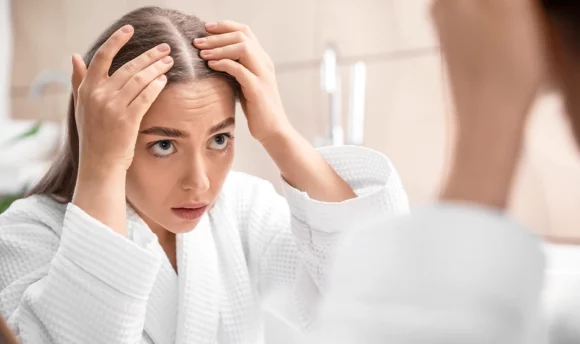How Long Does It Take for Hair to Grow Back? Hair Experts Weigh In
Hair loss can be an emotionally and physically challenging process. Learn how long it takes for hair to regrow after different types of hair loss and what you can do to speed up the process.

Hair is an important part of our body that affects our beauty, self-esteem, and satisfaction. It is like a crown. People notice it every time they see you. And losing it can significantly impact how you feel about yourself and how you believe others think about you.
Although it’s common to lose a few hairs a day and not notice it, it can be traumatizing if you have thinning hair, lose hair due to a medical condition, or cut it.
Growing long hair can be beautiful and rewarding. But how long does it take for hair to grow back?
The truth is that hair regrowth depends on many factors. Read on to understand these factors, learn tips to regrow hair more quickly, and get expert advice on how long it takes to regrow hair after any situation, be it chemotherapy, nutritional deficiencies, hormonal changes, or shaving.
How Long Does It Take for Hair to Grow Back? We Break It Down
On average, hair grows about half an inch every month. This means you may expect to grow 6 inches of hair per year, which may vary depending on age, gender, lifestyle, and genetics.
Ethnicity can also influence the rate of hair growth. According to studies, the hair of Asian people grows the fastest at about 0.49 inches per month, the hair of White people grows at about 0.44 inches per month, and the hair of Black people grows at 0.33 inches per month. On average, growing your hair 12 inches will take around two years.
Discover how long it can take to grow hair after various types of hair loss.
#1 After a haircut
Since the average rate of hair growth is half an inch every month, after a haircut, it can take a few years for shoulder-length hair to grow back.
It all depends on several factors, such as your hair type, ethnicity, and overall health. Your age and lifestyle habits will also affect how quickly your hair grows back after a haircut.
#2 After chemotherapy
Hair begins to grow back about 2–3 weeks after chemotherapy is completed. However, the new hair may be thin, fine, and of a different texture or color.
Hair growth may continue for several months, and it may take 6–12 months or longer to fully regrow to its normal length and thickness. In rare cases, some people may experience irreversible hair loss caused by years of rigorous chemotherapy.
#3 With alopecia areata
Alopecia areata is a skin condition that causes unexpected hair loss on the scalp and, in some cases, other body regions. Most people’s hair ultimately grows back to the affected places, but this can take months.
Alopecia areata, however, can be unpredictable. Your hair may begin to come back at any time, but it may fall out again, and hair may fully regrow in some people but not others.
#4 After hormonal changes
Growing hair back after hormonal changes vary according to the individual and the specific hormonal change. For example, hair fall or shedding is normal after childbirth due to falling estrogen levels, and it might take several months for the hair to regrow.
In other circumstances, it may take a year or more for the hair to grow back fully.
Similarly, hormonal changes during menopause can cause hair to be thin or become brittle, although in many cases, this is a slow process that might take several years. Hair growth may also be slower than the average 0.5 inches per month during this period.
#5 After nutritional deficiencies
Vitamin B12, iron, biotin, folate, and zinc are all linked to hair loss. Restrictive diets that limit entire food categories can also result in hair loss due to nutrient deficiency or stress.
However, boosting your intake through your diet or supplements can help. It will take 2–3 months for the hair to regrow after a proper diet is resumed.
#6 After stressful events
Sudden periods of stress can lead to telogen effluvium, a form of hair loss in which excessive hairs are prematurely moved into the telogen phase. This type of hair loss is reversible, and people return to normal hair growth within 3–6 months. However, if the source of stress is not addressed, it may hinder healthy hair regrowth.
Stress-relieving techniques like a daily scalp massage can help ease stress while increasing blood flow and promoting regrowth. Exercising regularly and drinking enough water can also be helpful.
#7 After waxing or shaving
For shaving, hair typically grows back within a few days to a week, as shaving only removes the surface part of the hair follicle.
After waxing, hair can take 2–6 weeks to grow back as the hair roots are removed from the follicle under the skin’s surface. Most people re-wax their hair every 3–6 weeks.
Hair Regrowth: How Does It Work?
Hair growth begins at the follicles, openings on the scalp’s surface through which hair grows. On average, the scalp contains 80,000–120,000 follicles.
Hair grows from the bottom of a follicle under your skin. The blood in your scalp travels to the follicle and delivers oxygen and nutrients to the hair roots, promoting hair growth.
Hair growth has 4 stages: anagen, telogen, catagen, and exogen. Anagen is the active growth phase and lasts between 2–8 years. Catagen is a transitional period that happens when hair stops growing. This can last for 4–6 weeks. The telogen phase is the resting stage when hair doesn’t grow or fall out, lasting about 2–3 months.
The exogen stage is the shedding stage, where hair falls out, lasting about 2–5 months. It is normal to lose 50–100 strands every day.
7 Main Factors That Influence Hair Regrowth: Maximize Your Hair’s Potential
Several factors affect how fast hair grows. Knowing these factors will help you have the most control of your hair and maximize its growth.
#1 Age
Age impacts hair color, structure, density, and thickness. Hair growth reduces as your body and hair follicles age. As you age, some follicles may completely stop producing hair. This is called male pattern baldness, female pattern hair loss, or hereditary hair loss.
Hormonal changes associated with aging (such as menopause) can also impact hair growth. By the age of 50, approximately 40% of women and 50% of men will have experienced some hair loss, and these figures only rise with age.
#2 Sex
Men tend to grow hair faster than women. This is because of the hormonal differences between men and women that can impact hair growth. For example, testosterone, a male hormone, can cause hair to grow thicker and coarser in men than in women. Thicker hair is less susceptible to damage, making it easier to maintain its length.
When pregnant, women have higher estrogen levels, which causes hair to remain in the growth phase (anagen) longer, promoting faster hair growth.
#3 General health
Certain medical conditions, such as thyroid disease, affect the metabolism of cells found in hair follicles. Both high and low thyroid hormone levels can cause brittle hair and hair fall. Other autoimmune diseases that have an impact on hair growth include celiac disease, systemic lupus erythematosus, ulcerative colitis, and Crohn’s disease.
Some medications such as blood thinners, anti-inflammatory drugs, anticoagulants, antidepressants, and oral contraceptives also have hair loss as a negative side effect.
#4 Stress
Hair loss can be triggered by a high-stress level, such as developing a medical condition or going through a life-changing event like divorce or bankruptcy. This can interrupt the normal cycle of hair growth.
Many people suffer from acute telogen effluvium, in which up to 70% of hair follicles enter a resting and shedding stage of the hair cycle.
#5 Vitamins and supplements
Lack of vitamins and minerals required for optimal cell growth and function may lead to hair loss. Studies suggest that deficiencies in omega-3s, iron, and zinc are most often linked to that.
Vitamins are necessary for healthy hair growth and may help prevent hair thinning and shedding. Vitamins B, D, E, zinc, biotin, and iron are among the essential vitamins for hair growth.
#6 Hair and scalp treatment
Certain hairstyles can cause significant hair damage and breakage, which could result in hair loss and thinning. Shampooing or blow-drying too frequently, using heated styling products too often, pulling on the hair, or rubbing the scalp too aggressively can all lead to hair loss.
Perms, relaxers, and hair colors may also worsen damage-induced hair loss.
#7 Lifestyle
Lifestyle factors like smoking, diet, and sleep can hinder hair growth. Smoking causes many health concerns, including lung cancer, heart disease, and strokes, but new evidence suggests it may also cause hair loss.
Smoking not only impacts circulation in the body, but it also impacts blood flow to the hair follicles and can damage their DNA.
Diet has an impact on hair regrowth as well. You’re what you eat. Therefore, including a more balanced diet in your lifestyle is an excellent place to begin to see beneficial results. A diet deficient in vital vitamins and minerals can impact your hair’s condition and potentially cause hair loss.
It is critical to eat a well-balanced diet high in protein, iron, zinc, and vitamins B and D. These nutrients help to promote healthy hair growth.
Sleep is as important for your hair growth as diet. Poor sleep patterns can contribute to various health problems, including those related to hair growth. Our bodies absorb nutrients and repair cells when we sleep.
Lack of sleep weakens our immune system and inhibits nutrient absorption that our bodies and hair require, resulting in weak hair strands and a growth standstill.
How to Make Hair Grow Back Faster
While there is no guaranteed way to make your hair grow faster, there are some techniques you can use to foster the process.
Give yourself a scalp massage. Regular scalp massages help hair grow thicker. Massage is believed to help relieve stress, which can contribute to hair loss. They also feel amazing. Consider using a scalp massager or use your fingers to gently squeeze, stretch, and pinch your scalp for several minutes each day.
You can also use essential and carrier oils, like argan oil, to stimulate hair growth. Carrier oils can offer your hair many health benefits, including improved scalp health, moisturizing strands, and promoting hair growth.
Trimming your hair’s split ends is another strategy you should regularly use to help grow your hair back faster. Split ends, if left untrimmed, may move up the hair shaft, shortening your hair.
You must also know how to dry your hair properly after shampooing to avoid frizzy, damaged strands. Use a microfiber towel or a t-shirt to gently pat your hair dry. Avoid rubbing your hair or twisting it in the towel.
FAQs
Yes, hair can grow back after balding through certain strategies, such as scalp massage, regular use of essential oils, or medical treatment. However, you may need to try more than one form of treatment to achieve the desired outcome.
It can take 2 weeks to grow your hair after shaving. This is because shaving eliminates the hair just above the hair roots, allowing it to regrow.
Acute telogen effluvium lasts less than 6 months, and hair loss usually occurs 2–3 months after the stressful event.
Although alopecia is a permanent hair loss, in its early stages, the hair follicle is not permanently damaged. Most people’s hair grows back in the affected areas, but this can be unpredictable, as some people’s hair grows back fully, and some people’s hair does not.
A Word From a Trichologist
While your hair may regrow on its own, you should see your dermatologist if you notice decreased hair growth, severely damaged hair, or significant changes. Treatment is sometimes needed to prevent further hair loss.
Your doctor may recommend at-home hair loss treatments or hair regrowth procedures. They can also check for nutrient deficiencies and recommend specific products that may help.
Many people with hair loss can experience hair regrowth with a proper diagnosis. If you need hair regrowth treatment, the sooner you start, the more likely your hair will grow back.
Remember that while not all types of hair loss are treatable, a dermatologist can help prevent further hair loss, and treatment can take months before you see results. Patience is key.
Conclusion
Hair regrows at an average rate of about 0.5 inches per month and 6 inches per year, which is a gradual process that requires patience. While specific haircare routines and products can help improve hair appearance and health, there is no quick fix for hair growth.
Maintaining a nutritious diet, staying hydrated, and reducing stress can help promote healthy hair growth over time.
If your hair loss is due to a medical condition, you’ll need to see your doctor to treat the underlying problem and restore your hair.

















































 Select your language:
Select your language: 








